25 Weeks Pregnant With Twins: What to Expect, Symptoms & Belly Pictures
You may be thinking about what to expect, when you’re 25 weeks pregnant with twins. What to expect differs a lot depending on the course of your pregnancy, and the shape you were in before you got pregnant. However, many women pregnant with twins, do feel a bit – or very – uncomfortable at this point in their pregnancy.
Pregnancy diet, nutrition & prenatal vitamins
You need to take care of yourself and listen to your body. If you’re tired, you should rest. Get your partner, family or friends to look after any other children. If you haven’t got a large network consider looking into whether you have a mother of twins club in your neighborhood. Some of the clubs offer a buddy system, where they’ll pair you with an experienced mother of twins.
Also, if you’re very tired, it’s a good idea to have your iron levels checked. Iron deficiency will make you feel exhausted, and you’ll need an iron supplement.
Pregnancy symptoms & belly pictures
Besides feeling exhausted and uncomfortable you may experience:
- Nosebleeds. This is because the amount of blood in your body increases and puts more pressure on the vessels, causing them to rupture more easily.
- You shouldn’t experience vaginal bleeding, but if you for instance notice spotting after intercourse it rarely has any significance. However, you should consult your doctor or midwife if you experience spotting. You need to be sure that you’re not going into preterm labour. Read about early signs that you’re going into labor. If there are signs of early labor, your cervix should be checked, and an ultrasound scan should be performed.


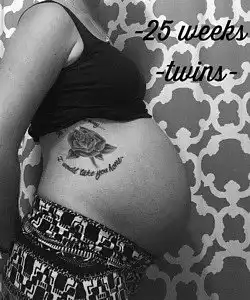
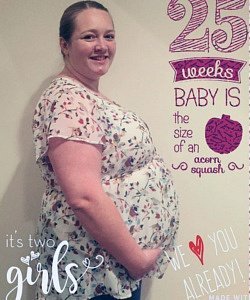







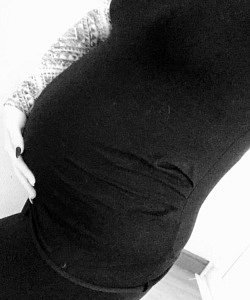
Baby size & fetal development
Your babies measure approximately 34,5 centimeters (13.58 inches), when you’re 25 weeks pregnant with twins. The median weight for dichorionic twins is 820 grams (1lbs, 12oz) and for monochorionic twins it’s 795 grams (1lbs, 12oz). Look at our estimated fetal weight charts to learn more about how twins grow in the second half of pregnancy. Your babies internal organs – except the lungs – are fully developed and can function outside the womb. Your babies will have a chance of survival if you give birth when you’re 25 weeks pregnant with twins. However, they need to be born at a medical facility. They’ll be very fragile, and there will be complications related to your babies being born extremely preterm. They’ll need a lot of medical care and attention, but the progress of medical care in recent years means that extremely premature babies have a better survival rate than ever before. However, it’s still very important that your babies stay in your womb at 25 weeks pregnant with twins. Their lungs need to mature, and they need to grow and gain weight. The risks of medical and social disabilities are much higher when babies are born extremely preterm.
Previous week – 24 weeks pregnant with twins
Next week – 26 weeks pregnant with twins
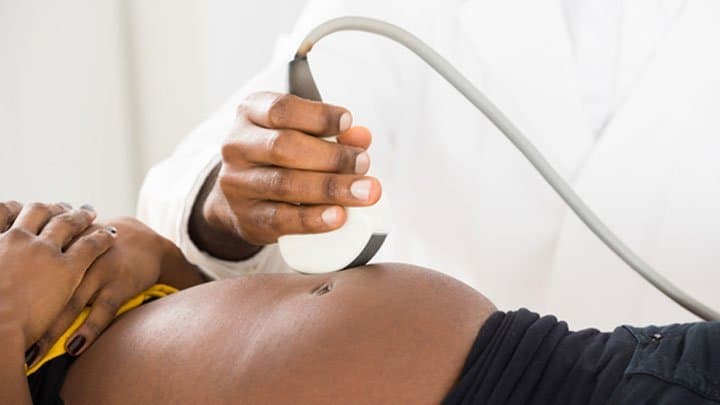





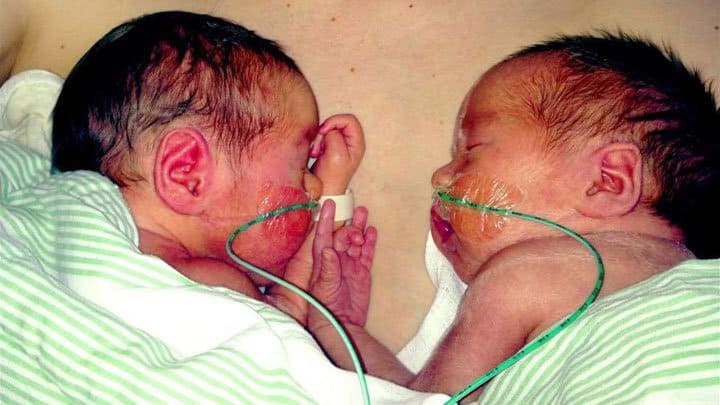








@Kate Phillipa Clark. Please double-check your estimated weights for twins (both DC and MC), they’re very off. Indicate a way higher weight than the clinically accepted estimate is for SINGLE babies (eg. for 25 weeks the average weight estimate for single foetuses is 660-680 grams). I understood that it’s based on a research that involved 3000+ women but that still isn’t representative. I suggest you do a bit of research (even web only) or speak to an FMU Multiples specialist. They’ll confirm that your weight estimations are too high.
@Anna, thanks for reaching out. Did you notice that the weights indicated are median weights? The researches behind the study believe that the degree of precision in their sample is sufficient to create clinical useful charts (the survey was published in the American Journal of Obstetrics & Gynecology). However, I will check with a few maternal-fetal medicine specialists.